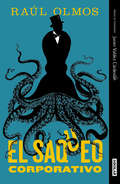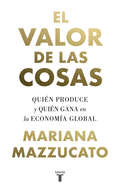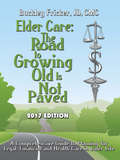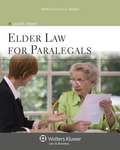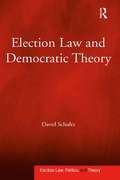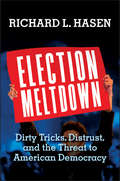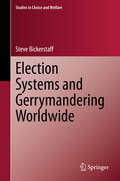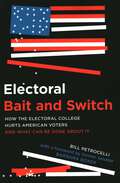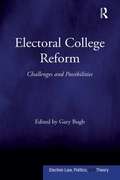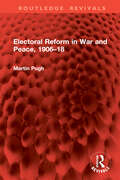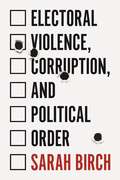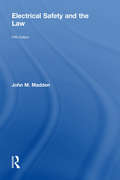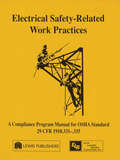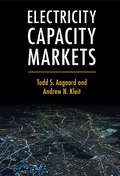- Table View
- List View
El rey del cash: El saqueo oculto del presidente y su equipo cercano
by Elena Chávez«El rey del cash es una crónica nítida y sin concesiones a través de la cual se reconstruye la historia secreta política, personal y financiera de AMLO y su círculo más cercano, indispensable para entender el adn del mandatario, de la llamada 4T y Morena.» —Anabel Hernández «Este es un testimonio sobre los 18 años que viví cerca del presidente Andrés Manuel López Obrador, al ser pareja de su entonces jefe de prensa César Yáñez. Ellos dos son los protagonistas de esta historia llena de traiciones políticas, ambiciones personales, infidelidades, abusos laborales, corrupción y autoritarismo. Mi propósito es evidenciar cómo el poder ha sido el gran amor y la obsesión de López Obrador, y cómo el odio y el resentimiento han sido el alimento que lo sostiene.» Cuento aquí a detalle cómo los operadores del presidente consiguieron durante mucho tiempo miles de millones de pesos para cumplirle a su jefe, y de paso también se sirvieron con la cuchara grande. No busco denostar a ninguno de los personajes que aquí aparecen, sino tan solo romper un pacto de impunidad. » Los mexicanos tienen derecho a conocer la verdadera cara de la nueva mafia del poder o, mejor dicho, de la secta en el poder. Que vea quien quiera ver, y escuche quien quiera escuchar.» —Elena Chávez
El rostro de la guerra: Crónicas en primera línea 1937-1985
by Martha GellhornLas crónicas de la mítica corresponsal Martha Gellhorn, desde la guerra civil española hasta los conflictos de Centroamérica de los años noventa. Martha Gellhorn, periodista y escritora estadounidense, vivió como corresponsal de guerra los conflictos bélicos más importantes de la segunda mitad del siglo XX. Este libro recoge los sentimientos, las impresiones y el testimonio directo de Gellhorn en la Guerra Civil española, las guerras de Finlandia, de China, la Segunda Guerra Mundial, la guerra de Java, las guerras y conflictos en Oriente Próximo, Centroamérica y Vietnam. «Escribí muy deprisa [...] -diría Gellhorn-, siempre temía olvidar el sonido, el olor, las palabras, los gestos exactos que eran propios de ese momento y ese lugar». Los reportajes aquí reunidos se muestran como un reflejo de esos intensos momentos. Recuentos sinceros que revelan laprofunda empatíade una mujer que supo comprenderla vulnerabilidad del ser humano y transmitirla en sus crónicas. Acompañados al final de una serie de textos escritos por la autora con la perspectiva que da el paso del tiempo y de una visión general propia que refleja su actitud contra las armas nucleares y su amenaza de la guerra, las crónicas de Martha Gellhorn son un clásico en su género y han creado escuela en todo el mundo. Críticas:«Un brillante libro anti-guerra.»The New York Times «El estilo de Gellhorn es simplemente fascinante.»The Guardian «Una colección excepcional de crónicas punzantes pero compasivas de la tragedia y el sufrimiento de la guerra.»Library Thing
El saqueo corporativo (Premio de periodismo Javier Valdez Cárdenas #Volumen 20)
by Raúl OlmosLos políticos reciben los sobornos... ¿Pero quién los paga? En México, la corrupción de las grandes empresas es igual o peor que la de los gobernantes: algunas corporaciones no sólo mueven toneladas de dinero para burlar la ley, sino que lo hacen con total impunidad. Prácticamente nadie investiga o castiga a las transnacionales que reparten sobornos. Este libro -ganador del Premio de Periodismo Javier Valdez Cárdenas 2019- rompe el círculo vicioso de silencio y simulación y les pone nombre y apellido a las compañías señaladas por malas prácticas, explica los esquemas de la transa y las razones de la impunidad desatada. La suciedad en el sector salud, la podredumbre de los supermercados, los saqueadores de Pemex, los cárteles empresariales, las artimañas para acaparar el mercado, el saqueo de las mineras... las ganancias de los hombres del dinero muy por encima del bien colectivo.
El secuestro de la justicia: Virtudes y problemas del sistema judicial
by Ignacio Escolar Joaquim Bosch Grau¿Está la justicia española secuestrada por los políticos? Joaquim Bosch (ex portavoz de Juezas y Jueces para la Democracia) e Ignacio Escolar (director de eldiario.es) han unido fuerzas para escribir un libro necesario, incisivo y pedagógico sobre la Justicia. El sistema judicial está en crisis. Así lo denuncia esta reflexión crítica sobre un deterioro que afecta profundamente a nuestra democracia. En una escalada sin precedentes, las injerencias políticas son muy visibles, se concentran en la cúpula judicial y son especialmente peligrosas en los casos de corrupción. Por otro lado, la ciudadanía percibe que las leyes no siempre son iguales para todos. Las maniobras que tratan de capturar las instituciones judiciales están relacionadas con un fenómeno más amplio: los intentos de secuestro de la Justicia como valor. Por eso los autores también estudian: las injusticias que padecen las víctimas de violencia machista, y los que padecen abusos bancarios; los problemas en la aplicación de la prisión provisional o los excesos en los límites de la política de penas de privación de libertad; el drama de los refugiados y la criminalización de los inmigrantes; la falta de reparación de las víctimas del franquismo; la actuación de la justicia en el conflicto catalán; y los crecientes recortes de libertades. Pero El secuestro de la Justicia es también una defensa de la magnífica base del sistema judicial, esa inmensa mayoría de magistrados que no se ha dejado contaminar. Como los que llevaron los abusos bancarios a la jurisdicción europea y vencieron. O los que, sin medios suficientes, investigan la corrupción y ponen contra las cuerdas a políticos y a empresarios. La crítica ha dicho...«Relato pedagógico sobre separación de poderes.»EFE «Un texto ensayístico, pero escrito con estilo periodístico, orientado a plantear una larga serie de reflexiones y dudas sobre el llamado tercer poder.»Juan Bolea, El Periódico de Aragón «Un libro fundamentalpara entender nuestro país. No solo recomendable, sino imprescindible.»Carlos Ávila, Andamios (y la vida sigue)
El sentido de la realidad: Sobre las ideas y su historia
by Isaiah BerlinTaurus recupera El sentido de la realidad, el libro más personal de uno de los principales pensadores liberales del siglo XX. ¿Cómo construir una sociedad decente?¿Por qué ciertas ideas aparentemente nobles y hermosaspueden alimentar las peores ideologías? Referente ineludible en la historia de las ideas, Berlin recorre magistralmente, en estos nueve ensayos, las ideas que han gobernado la historia europea durante los últimos tres siglos: nacionalismo, liberalismo y especialmente marxismo. Con el fin de extraer lecciones morales, Berlin se pregunta por qué los seres humanos tienden a admirar a hombres movidos por la ambición, los celos o la vanidad monomaníaca -incluidas figuras notables de la historia como Pedro el Grande y Napoleón-, y proporciona algunas respuestas, siempre reveladoras, en este estudio de las ideas. El sentido de la realidad incluye textos clave de quien ha sido considerado uno de los mejores ensayistas en inglés, y cubre un amplio abanico de temas: el realismo en la historia, naturaleza y el impacto del marxismo, la historia del socialismo, la radical revolución cultural llevada a cabo por los románticos, las nociones rusas de compromiso artístico, o la práctica y el origen del nacionalismo... Reseñas:«Este libro es indispensable para cualquiera que quiera comprender la historia de las ideas.»John Gray, The New York Times Book Review «El viejo zorro del liberalismo ofrece esta obra perspicaz. Es tan brillante a la hora de repensar el pasado como a la de transmitir su pensamiento.»Kirkus Reviews «Erudito pero no académico, se dirige al lector general, y habla con una energía tan contagiosa que nos arrastra a un territorio que nos parecía inaccesible, y se convierte en el mejor guía para movernos en la emocionante historia de las ideas.»Robert Darnton, The New York Review of Books «Si es posible elevar más una reputación ya tan notable, estos ensayos podrían lograrlo. Son textos de urbanidad, perspicacia, profunda erudición y gran elegancia literaria.»A.C. Grayling, Financial Times
El sexenio de Televisa: Conjuras del poder mediático
by Jenaro VillamilEl imperio televisivo guarda celosamente, como en los melodramas que produce, una serie de historias secretas de familia, de historias de brokers, de fraudes financieros a sus accionistas y de presiones políticas que ponen en evidencia el poder ilimitado de este monopolio. Es hora de que la opinión pública conozca estas historias. El sexenio de Televisa es resultado de una investigación excepcional que documenta cómo el consorcio ha adquirido un enorme poder durante los gobiernos panistas; en particular, durante el mandato de Felipe Calderón. Con ello demuestra que, actualmente, esta empresa es un poder fáctico a plenitud, es decir, un poder real por encima de las leyes e instituciones del Estado mexicano. Un Estado dentro del Estado. Jenaro Villamil va revelando, una a una, las historias no públicas, en varios casos auténticas conjuras que documentan la forma en que se ha conformado este poder desmedido, incontrolable, avasallante. Así, siendo "losdueños del circo político" en esta "república de pantalla", nos enteramos cómo sus principales ejecutivos, los "cuatro fantásticos", no sólo consiguen ingresos multimillonarios vendiendo, sin restricción alguna, espacios publicitarios a los partidos y a los gobiernos, sino que se dan el lujo de que se legisle a su favor y de que el control de las elecciones pase no por el Congreso sino a través del "canal de las estrellas". Entre las múltiples historias secretas que aquí se cuentan, destacan: las oscuras maniobras en torno a la llamada Licitación 21; el papel que jugó el consorcio en la trama de los videoescándalos y la guerra sucia contra AMLO; la ambiciosa operación de cooptación y legitimación de Televisa conocida como Iniciativa México; los engaños y maquinaciones, auspiciados por el gobierno en turno, que permitieron a Emilio Azcárraga Jean el control accionario del consorcio; las tortuosas manipulaciones para dominar la televisión por cable; el melodrama de encuentros y desencuentros entre Televisa y Univisión; el uso de brokers para vender campañas de publicidad política a largo plazo, como la que hoy opera para llevar a Enrique Peña Nieto a la Presidencia en 2012, etcétera. Ante tal exhibición de atrocidades, el autor se pregunta: ¿será cierto, como afirman los dueños del circo, que "los mexicanos tienen la televisión que se merecen"?
El soborno
by John GrishamEl juez más corrupto de la historia, la mafia y una joven investigadora con un informante secreto en el impresionante nuevo thriller del autor favorito de América: John Grisham. «El mejor autor vivo de thriller.»Ken Follett Lacy Stoltz es una joven investigadora y abogada de Florida, y su trabajo consiste en responder a las demandas relacionadas con la mala praxis judicial. Tras nueve años en el puesto, sabe que la mayor parte de los problemas derivan de incompetencias. De repente le llega un caso de corrupción. Greg Myers afirma conocer un juez de Florida que ha robado más dinero que el resto de los jueces poco honestos juntos. Estaba involucrado en secreto con la construcción de un gran casino en tierras indígenas. La mafia financió el casino y ahora se lleva cada mes una buena tajada de la caja mensual. El juez también se lleva su parte y mira hacia otro lado. Todos contentos. Pero ahora Greg quiere poner punto final a esta situación. Su único cliente conoce la verdad y quiere contarlo todo. Greg presenta una denuncia y el caso se le asigna a Lacy Stoltz, quien de inmediato sospecha que puede ser peligroso. Pero el peligro es una cosa y la muerte, otra muy distinta.
El socio
by John GrishamUn muerto no puede escapar eternamente... Lo encontraron en un pequeño pueblo de Brasil. Tenía otro nombre y otro aspecto, pero estaban seguros de haber dado con él. Cuatro años antes se llamaba Patrick S. Lanigan. Había muerto en un accidente de tráfico en febrero de 1992. Estaba enterrado en un cementerio de Biloxi, Mississippi. Había sido socio en un prometedor bufete de abogados, tenía una esposa guapa, una nueva hija y un futuro espléndido. A las seis semanas de su muerte, noventa millones de dólares desaparecieron de las cuentas de la empresa. Fue entonces cuando sus socios supieron que seguía con vida. La crítica ha dicho...«Tiene suspense, dramatismo y obsesión por el detalle: todos los ingredientes que han convertido las novelas de Grisham en best sellers... Una lectura estupenda.»Sunday Mirror
El socio
by John GrishamEspiaron cada uno de sus movimientos hasta obtener la seguridad absoluta de que era el. Se hacia llamar Danilo Silva y habitaba una modesta casa de un ciudad pequena de Brasil. Pesaba mucho menos e incluso su cara era levemente distinta, gracias a la intervencion de un cirujano. Al parecer, vivia solo. Es decir, no guardaba ninguna similitud con aquel abogado llamado Patrick Lanigan que, cuatro anos antes, se habia esfumado con noventa millones de dolares dejando atras a su hermosa mujer y a su adorable hija. Pero ellos estaban convencidos de que Danilo Silva era Lanigan, y de que con su captura pondrian fin a aquella historia. Grave error: en realidad acaba de emprezar.
El valor de las cosas: Quién produce y quién gana en la economía global
by Mariana Mazzucato¿En qué mundo queremos vivir?Mariana Mazzucato, la economista del momento, prende la mecha de un debate necesario. «Mucho ojo con Mazzucato, la economista más temible del mundo.»Helen Rumbelow, The Times ¿Quién crea realmente la riqueza? ¿Qué actividades la impulsan? ¿Cuáles se limitan a extraerla? ¿Cuáles la destruyen? Nuestras economías tienden a premiar la extracción de valor antes que su creación -el proceso productivo que verdaderamente impulsa una economía y una sociedad saludables-, y la diferencia entre ambos conceptos se ha desdibujado de manera notable. A partir de ejemplos que van desde Silicon Valley hasta el sector financiero pasando por las grandes farmacéuticas, Mariana Mazzucato muestra de manera magistral cómo las nociones borrosas que tenemos del valor han permitido a ciertos actores de la economía retratarse a sí mismos como generadores de valor, mientras que en realidad se limitan a mover el existente o, lo que es peor, a destruirlo. Tendemos a perder de vista la auténtica naturaleza del valor y por qué es importante, cuestiones que en el pasado estuvieron en el centro del pensamiento económico y que, sencillamente, ya no se discuten. Si queremos reemplazar el actual sistema parasitario por otro sostenible que funcione para todos, es urgente y necesario repensar el origen de la riqueza y responder las preguntas clave de Mazzucato, que nos llevan al verdadero gran interrogante: ¿en qué mundo queremos vivir? La crítica ha dicho:«Mazzucato nos obliga a cuestionar creencias arraigadas sobre cómo funcionan las economías y quién se beneficia en realidad. Este libro agrega valor en sí mismo.»Martin Wolf, Financial Times «Uno de los libros de economía más incisivos de los últimos tiempos.»Jeffrey Madrick, The New York Review of Books «Es tan franca en sus opiniones como elocuente a la hora de expresarlas.»John Thornhill, Financial Times «Las ideas de Mazzucato son combustible para un debate creciente sobre qué parte de la riqueza del país debería estar a manos del sector privado.»Rana Foroohar, Time «Mazzucato busca reproducir la dinámica interacción público -privado-y el espíritu de aventura- que condujo a triunfos como la llegada del hombre a la Luna.»George Eaton, New Statesman «Rápidamente Mazzucato se está situando entre los intelectuales públicos más importantes del mundo. Le ha ofrecido a la izquierda una visión positiva del crecimiento basada en la innovación y la participación en los beneficios.»The Spectator «Un convincente llamamiento a reinventar el valor para lograr el mundo que todos queremos.»Nature «Un libro oportuno sobre conceptos cruciales que se han esfumado del discurso dominante. Una denuncia de cómo los extractores de valor y los buscadores de renta se han disfrazado de creadores de valor en la economía global.»Fran Boait, Prospect «Alguien debería hacer un musical de este libro. Eso es bastante improbable, lo reconozco, pero no tanto como parece. En 1893, el teatro Savoy organizó la penúltima opereta de Gilbert y Sullivan, Utopia, Limited. Es hora de volver a trabajar en la idea y Mariana Mazzucato es candidata para escribir el libreto.»Philip Collins, The Times «Una reflexión fundamental sobre qué constituye el verdadero valor en la economía.»Stephen Denning, Forbes «Una mirada fresca al significado del valor en economía. Este libro accesible seducirá a cualquier lector curioso.»Booklist «El valor de las cosas está recibiendo elogios en Twitter por parte de ministros de finanzas y estudiantes idealistas, y está claro que será una lectura esencial.»Delphine Strauss, Financial Times</
Elder Care The Road To Growing Old is Not Paved: A Comprehensive Reference Guide to Planning for Legal, Financial and Health Care in Later Life
by Buckley FrickerA Comprehensive Guide to Planning for Legal, Financial and Health Care in Later Life. Medicare, Medicaid, Social Security, Estate Planning Documents, Housing and Care Giver Costs and Options, Funding Sources, and much more.
Elder Care in Crisis: How the Social Safety Net Fails Families (Health, Society, and Inequality #2)
by Emily K. AbelExplains why there is a crisis in caring for elderly people and how the COVID-19 pandemic exacerbated itBecause government policies are based on an ethic of family responsibility, repeated calls to support family members caring for the burgeoning elderly population have gone unanswered. Without publicly funded long-term care services, many family caregivers cannot find relief from obligations that threaten to overwhelm them. The crisis also stems from the plight of direct care workers (nursing home assistants and home health aides), most of whom are women from racially marginalized groups who receive little respect, remuneration, or job security. Drawing on an online support group for people caring for spouses and partners with dementia, Elder Care in Crisis examines the availability and quality of respite care (which provides temporary relief from the burdens of care), the long, tortuous process through which family members decide whether to move spouses and partners to institutions, and the likelihood that caregivers will engage in political action to demand greater public support. When the pandemic began, caregivers watched in horror as nursing homes turned into deathtraps and then locked their doors to visitors. Terrified by the possibility of loved ones in nursing homes contracting the disease or suffering from loneliness, some caregivers brought them home. Others endured the pain of leaving relatives with severe cognitive impairments at the hospital door and the difficulties of sheltering in place with people with dementia who could not understand safety regulations or describe their symptoms. Direct care workers were compelled to accept unsafe conditions or leave the labor force. At the same time, however, the disaster provided an impetus for change and helped activists and scholars develop a vision of a future in which care is central to social life.Elder Care in Crisis exposes the harrowing state of growing old in America, offering concrete solutions and illustrating why they are necessary.
Elder Law for Paralegals
by Laurel A. VietzenElder Law for Paralegals prepares students to assume a productive role in law firms that focus on elder law. A wealth of learning and teaching aids reinforces the lessons in the text. A highly adaptable structure and generous ancillary support make teaching Elder Law and related courses a pleasure: if you've never taught it before. Timely and practical, Elder Law for Paralegals features: * consistently rich and innovative pedagogy, including crossword puzzles, marginal definitions, review questions, and practice exercises, * practical tips that address cultural and generational differences between young adults and the elderly, * up-to-date internet resources, conveniently referenced throughout the text.
Election Administration in the United States
by R. Michael Alvarez Bernard GrofmanThis book tells the story of how the way in which we conduct elections has changed after the Florida recount litigation of 2000. Some of the nation's leading experts look at various aspects of election administration, including issues of ballot format, changes in registration procedures, the growth in the availability of absentee ballot rules and other forms of "convenience voting," and changes in the technology used to record our votes. They also look at how the Bush v. Gore decision has been used by courts that monitor the election process and at the consequences of changes in practice for levels of invalid ballots, magnitude of racial disparities in voting, voter turnout, and access to the ballot by those living outside the United States. The editors, in their introduction, also consider the normative question of exactly what we want a voting system to do. An epilogue by two leading election law specialists looks at how election administration and election contest issues played out in the 2012 presidential election.
Election Law and Democratic Theory (Election Law, Politics, And Theory Ser.)
by David SchultzWhile numerous books and articles examine various aspects either of democratic theory or of specific topics in election law, there is no comprehensive book that provides a detailed and scholarly discussion of the political and democratic theory underpinnings of election law. Election Law and Democratic Theory fills this important gap, as author David Schultz offers a scholarly analysis of the political principles and democratic values underlying election law and the regulation of political campaigns and participants in the United States. The book provides the first full-length examination of the political theories that form the basis for many of the current debates in election law that structure both Supreme Court and scholarly considerations of topics ranging from campaign finance reform, voting rights, reapportionment, and ballot access to the rights of political parties, the media, and other players in the system. It challenges much of the current debate in election law and argues for more discussion and development of a democratic political theory to support and guide election law jurisprudence.
Election Meltdown: Dirty Tricks, Distrust, and the Threat to American Democracy
by Richard L. HasenFrom the nation&’s leading expert, an indispensable analysis of key threats to the integrity of the 2020 American presidential election As the 2020 presidential campaign begins to take shape, there is widespread distrust of the fairness and accuracy of American elections. In this timely and accessible book, Richard L. Hasen uses riveting stories illustrating four factors increasing the mistrust. Voter suppression has escalated as a Republican tool aimed to depress turnout of likely Democratic voters, fueling suspicion. Pockets of incompetence in election administration, often in large cities controlled by Democrats, have created an opening to claims of unfairness. Old-fashioned and new-fangled dirty tricks, including foreign and domestic misinformation campaigns via social media, threaten electoral integrity. Inflammatory rhetoric about &“stolen&” elections supercharges distrust among hardcore partisans. Taking into account how each of these threats has manifested in recent years—most notably in the 2016 and 2018 elections—Hasen offers concrete steps that need to be taken to restore trust in American elections before the democratic process is completely undermined.
Election Systems and Gerrymandering Worldwide (Studies in Choice and Welfare)
by Steve BickerstaffThis book explores the similarities and differences among national election systems around the globe and sheds light on how election systems are susceptible to gerrymandering, which is the process by which an incumbent or a political party attempts to manipulate the boundaries of electoral districts for their own advantage. Presenting research showing that some of the worst electoral-system manipulation occurs in the oldest established democracies, the book explores how nations have modified the form of government to meet local conditions and how democracy is threatened by gerrymandering.
Electoral Bait and Switch: How the Electoral College Hurts American Voters and What Can Be Done about It
by Bill PetrocelliIt&’s a system that now fosters massive inequality in voting rights and opens the door to manipulation of presidential elections by foreign and domestic enemies of democracy. Electoral Bait & Switch is prescriptive, and accessible to the general reader.The current Electoral-Vote system presents a severe and growing threat to democracy in the United States. It has thwarted the will of a majority of the voters twice in the last five presidential elections (2000 and 2016) by elevating to office a candidate who received only a minority of the vote. This system is a distortion of the system envisioned by Alexander Hamilton, James Madison and the other framers of the Constitution. If it is not challenged and overturned, we are likely to face a continual series of electoral and constitutional crises.The constitutional right of Americans to an equal vote in presidential elections is being violated by this system on a massive scale. The value of an individual vote varies as much as three-to-one from state to state, and there are no two states where voters have the same voting-power. The current Elector system discriminates heavily against minority and poorer voters. The winner-take-all method of allocating Electoral votes also results in large pockets of &“useless votes&” and a system in which where you vote counts for far more than how you vote. Most ominously, evidence is now clear that the Electoral-Vote system has opened the door for voter suppression and manipulation of elections by domestic and foreign conspirators.
Electoral College Reform: Challenges and Possibilities (Election Law, Politics, And Theory Ser.)
by Gary BughThe United States has not updated the Electoral College system since the Twelfth Amendment was ratified in 1804, despite public opinion polls showing a majority of Americans are in favor of changing or outright abolishing it. So why hasn't the United States reformed this system? Electoral College Reform brings together new essays examining all aspects of this crucial debate, including the reasons for reform, the issues surrounding a constitutional amendment, the effect of the Electoral College on political campaigns and the possibilities for extra-constitutional avenues to change. The authors consider both the Federalists' vision of balanced representation and a more democratic and equality-based ideal. These competing frameworks, perhaps more than any other factor, account for centuries of American indecision on this key issue. By offering an unprecedented and carefully researched analysis of an always controversial subject, this volume explores the potential for changing a system that many contend is long overdue.
Electoral Reform in War and Peace, 1906–18 (Routledge Revivals)
by Martin PughThe Fourth Parliamentary Reform Act of 1918 gave the vote to nearly thirteen million men and over eight million women and determined the structure of electoral politics in twentieth-century Britain. Electoral Reform in War and Peace, 1906–18 (originally published in 1978) is the first attempt to explain this turning-point; it does so partly by exploring the relationship between reform of the franchise and reform of the electoral system between 1906 and 1918. The author’s analysis of the debate on Proportional Representation and the Alternative Vote sheds new light on the Liberal-Labour relationship in this period and shows why the Liberal and Labour Parties failed to reform the electoral system in 1917–18, thereby exposing themselves to twenty years of Conservative hegemony under the democratic franchise.The book attacks the status conventionally accorded to the militant suffragettes, particularly the Pankhursts, in the achievement of votes for women; it argues that the Pankhursts played a negligible role, at best, after 1914, and that the real progress made before the war was the work of the non-militant women largely ignored by historians. The author also offers a reinterpretation of wartime politics as a struggle over the timing of the General Election delayed from 1915 to 1918 and shows how this led to the emergence of a Reform Bill, more by accident than by design, through the innovation of the Speaker’s Conference. He considers the struggle over the Bill itself and the light thereby thrown upon the decline of the Liberal Party.Finally, the book analyses the relationship between wartime experience and political reform by arguing that reform grew essentially out of pre-war conditions, and by demonstrating how resilient attitudes remained under the impact of popular participation in the Great War. This forms a salutary corrective to the assumption that twentieth-century mass warfare had a democratising effect on British society.
Electoral Violence, Corruption, and Political Order
by Sarah BirchA comprehensive look at how violence has been used to manipulate competitive electoral processes around the world since World War IIThroughout their history, political elections have been threatened by conflict, and the use of force has in the past several decades been an integral part of electoral processes in a significant number of contemporary states. However, the study of elections has yet to produce a comprehensive account of electoral violence. Drawing on cross-national data sets together with fourteen detailed case studies from around the world, Electoral Violence, Corruption, and Political Order offers a global comparative analysis of violent electoral practices since the Second World War.Sarah Birch shows that the way power is structured in society largely explains why elections are at risk of violence in some contexts but not in others. Countries with high levels of corruption and weak democratic institutions are especially vulnerable to disruptions of electoral peace. She examines how corrupt actors use violence to back up other forms of electoral manipulation, including vote buying and ballot stuffing. In addition to investigating why electoral violence takes place, Birch considers what can be done to prevent it in the future, arguing that electoral authority and the quality of electoral governance are more important than the formal design of electoral institutions.Delving into a deeply influential aspect of political malpractice, Electoral Violence, Corruption, and Political Order explores the circumstances in which individuals choose to employ violence as an electoral strategy.
Electric Animal: Toward a Rhetoric of Wildlife
by Akira Mizuta LippitDifferentiation from animals helped to establish the notion of a human being, but the disappearance of animals now threatens that identity. This is the argument underlying Electric Animal, a probing exploration of the figure of the animal in modern culture. Akira Mizuta Lippit shows us the animal as a crucial figure in the definition of modernity—essential to developments in the natural sciences and technology, radical transformations in modern philosophy and literature, and the advent of psychoanalysis and the cinema. Moving beyond the dialectical framework that has traditionally bound animal and human being, Electric Animal raises a series of questions regarding the idea of animality in Western thought. Can animals communicate? Do they have consciousness? Are they aware of death? By tracing questions such as these through a wide range of texts by writers ranging from Friedrich Nietzsche to Jacques Derrida, Sigmund Freud to Vicki Hearne, Lewis Carroll to Franz Kafka, and Sergei Eisenstein to Gilles Deleuze, Lippit arrives at a remarkable thesis, revealing an extraordinary logical consensus in Western thought: animals do not have language and hence cannot die. The animal has, accordingly, haunted thought as a form of spectral and undead being. Lippit demonstrates how, in the late nineteenth century, this phantasmic concept of animal being reached the proportions of an epistemological crisis, engendering the disciplines and media of psychoanalysis, modern literature, and cinema, among others. Against the prohibitive logic of Western philosophy, these fields opened a space for rethinking animality. Technology, usually thought of in opposition to nature, came to serve as the repository for an unmournable animality-a kind of vast wildlife museum. A highly original work that charts new territory in current debates over language and mortality, subjectivity and technology, Electric Animal brings to light fundamental questions about the status of representation—of the animal and of ourselves—in the age of biomechanical reproduction.
Electrical Safety and the Law: A Guide To Compliance
by John M MaddenElectrical Safety and the Law describes the hazards and risks from the use of electricity, explaining with the help of case studies and accident statistics the types of accidents that occur and how they can be prevented by the use of safe installations, equipment and working practices. It describes the British legislation on the safety of electrical systems and electrotechnical machinery control systems, much of which stems from European Directives and which will therefore be affected by the UK’s decision to leave the EU (Brexit), and the main standards and guidance that can be used to secure compliance with the law. There are detailed descriptions covering the risks and preventive measures associated with electrical installations, construction sites, work near underground cables and overhead power lines, electrical equipment and installations in explosive atmospheres, electrical testing and electrotechnical control systems. Duty holders’ responsibilities for designing, installing, and maintaining safe systems are explained, as well as their responsibilities for employing competent staff. The fifth edition has been substantially updated to take account of considerable changes to the law, standards and guidance; it has been expanded to include: a new chapter on the Corporate Manslaughter and Corporate Homicide Act; a new chapter describing landlords’ legal responsibilities for electrical safety in private rented properties and social housing; a new chapter on the Electricity Safety Quality and Continuity Regulations; new information on offences, penalties, sentencing guidelines, and relevant case law; a description of the main requirements of BS 7671:2008 and other principal standards, many of which have been amended in recent years; new cases studies to illustrate the hazards and risks; information on changes to GB’s health and safety system.
Electrical Safety-Related Work Practices: OSHA Manual
by Richard EnnisElectrical Safety-Related Work Practices is a complete training package that describes 29 CFR 1910.331-.335, OSHA's Electrical Safety-Related Practices Standard, and outlines the requirements for training employees exposed to electrical hazards. The program presents a thorough overview of electrical safety as it applies to the standard. Topics covered include electrical accidents, qualified and unqualified persons, employee training, work practices covered by the standard, protective equipment, and protective shields and barriers. A complete implementation plan, standard checklists, a summary of the standard, and a copy of OSHA's "Illustrated Guide to Electrical Safety" are provided in addition to a sample employee training booklet. Electrical Safety-Related Work Practices is the perfect training tool for risk managers, safety managers, line production supervisors, engineers, and maintenance workers affected by this OSHA standard.This complete training package contains implementation/compliance manual, VHS tape, employee training booklet.
Electricity Capacity Markets
by Andrew N. Kleit Todd S. AagaardInitially created as afterthoughts to competitive electricity markets, capacity markets were intended to enhance system reliability. They have evolved into massive, highly controversial, and poorly understood billion-dollar institutions. Electricity Capacity Markets examines the rationales for creating capacity markets, how capacity markets work, and how well these markets are meeting their objectives. This book will appeal to energy experts and non-experts alike, across a range of disciplines, including economics, business, engineering, public policy, and law. Capacity markets are an important and provocative topic on their own, but they also offer an interesting case study of how well our energy systems are meeting the needs of our increasingly complex society. The challenges facing capacity markets – harnessing market forces for social good, creating networks that manage complexity, and achieving sustainability – are very much core challenges for our twenty-first century advanced industrial society.


